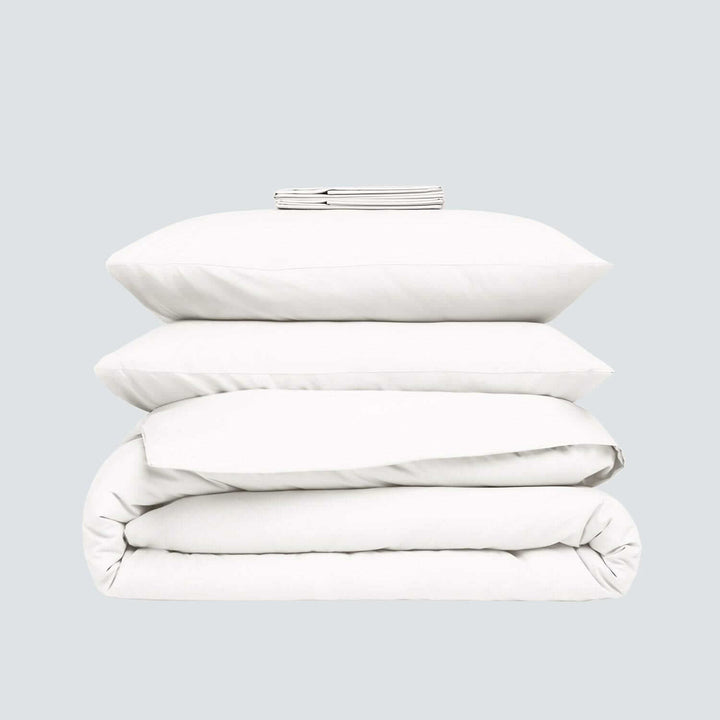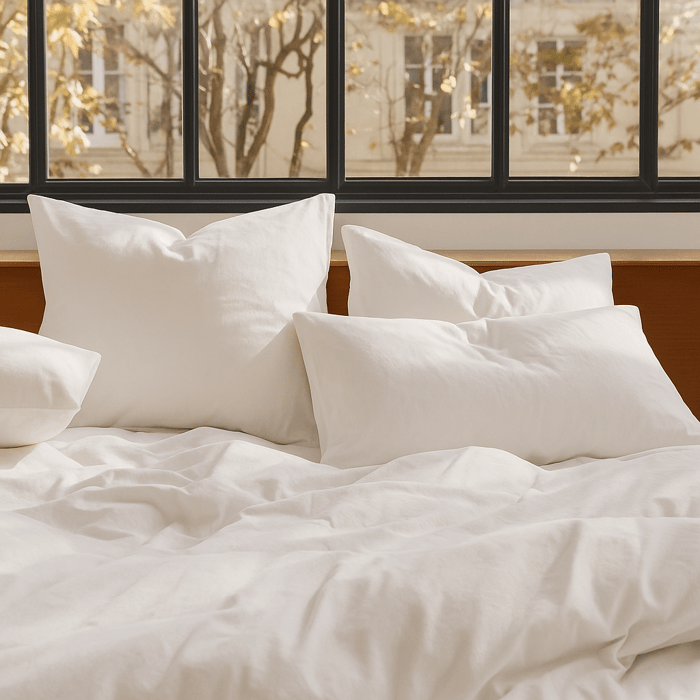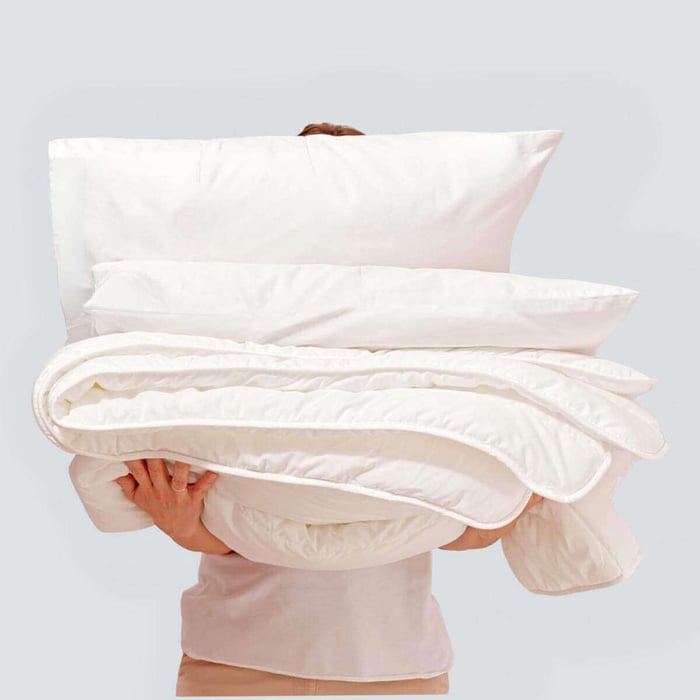Table of Contents
- Why Natural Fibers Outperform Synthetics in the Bedroom
- Why Choose Organic Wool Bedding
- Understanding the Magic of Merino Wool
- The Truth Behind “Best Organic Bedding” Labels
- Sustainability That Doesn’t Compromise on Comfort
- Healthier Skin, Fewer Allergies, and a Cleaner Sleep Environment
- Why Wool Bedding is an Investment in Long-Term Sleep Quality
- The Final Word: Make Sleep Work for You
- FAQs on Wool Duvet Inserts, Comforters & Sustainable Bedding
Quality sleep doesn’t happen by accident. It’s the result of thoughtful choices—whether it’s switching off devices at night, dialing down the caffeine, or, more surprisingly, changing what you sleep on. Research and user feedback consistently point to the physical materials in your bed as a key influence on sleep quality. If your bedding traps heat, irritates your skin, or doesn’t breathe well, your sleep will pay the price. So, what’s the game-changer here? Wool bedding. Specifically, regenerative merino wool bedding that supports your body’s natural rhythms and helps you experience a deeper, more restorative night’s sleep.
Why Natural Fibers Outperform Synthetics in the Bedroom
Synthetic bedding materials may be cheaper, but they often come with trade-offs—like night sweats, static cling, and uncomfortable stiffness. Natural fibers, by contrast, work harmoniously with your skin and environment. Wool, in particular, stands out for its exceptional breathability and moisture-wicking properties. Unlike polyester or down alternatives that insulate without allowing airflow, wool creates a balanced microclimate around your body. This unique quality helps regulate temperature, allowing you to stay cool when it’s warm and warm when it's chilly—without flipping your blanket on and off all night like a fidgety burrito.
This thermoregulation is especially important for those living in areas with large seasonal shifts, like in Colorado or in Victoria. Bedding that adjusts to you rather than forcing you to adapt to it? That’s a clear win.
That’s why an organic comforter made with breathable wool feels so different in real life — it adapts to your body instead of trapping heat like synthetics.
Why Choose Organic Wool Bedding
- Naturally temperature-regulating: keeps you cool in summer and warm in winter by circulating air through the fibers.
- Moisture-wicking comfort: absorbs and releases humidity to prevent night sweats and clamminess.
Hypoallergenic and gentle: resists dust mites, mold, and bacteria — ideal for sensitive skin and allergy sufferers.
Chemical-free softness: made without synthetic dyes, pesticides, or flame retardants, giving you cleaner air and skin contact.
Sustainably sourced: crafted from regenerative New Zealand farms that restore soil health and protect biodiversity.
Durable and long-lasting: retains loft and structure far longer than synthetic or down alternatives.
Understanding the Magic of Merino Wool
You might be wondering—what’s so special about merino wool bedding compared to regular wool? For starters, merino wool is ultra-fine, making it noticeably softer and gentler against your skin. It also boasts superior insulating qualities while remaining incredibly light. It’s not bulky or scratchy, and it doesn’t carry that “wet dog” scent that some lower-grade wools are notorious for. That means comfort isn’t sacrificed in pursuit of health or sustainability.
Merino wool also naturally resists dust mites, mold, and mildew. Those allergic sneezes that hit hard at 2 a.m.? They stand no chance. When you switch to merino wool bedding, you’re not just getting a more comfortable surface—you’re creating a healthier sleep environment.
Organic Wool Comforter

$342.00
$380.00
Our organic wool comforter is designed to keep you dry, balanced, and deeply comfortable all night. Unlike down or synthetic comforters that trap heat, our spun wool design wicks away moisture and prevents overheating, so you stay cool & dry.… Read more
The Truth Behind “Best Organic Bedding” Labels
Everyone wants the best organic bedding, but how do you tell genuine quality from greenwashing? True organic bedding goes beyond just avoiding pesticides. It includes responsibly sourced fibers, eco-friendly production, and ethical labor practices.
Antipodean takes this seriously. Every wool comforter is part of a regenerative cycle—wool is sourced from sheep raised on land that’s nurtured and replenished rather than depleted. That’s not just good for your bed—it’s good for the planet. So when you're making that late-night search for the best organic bedding, pay attention to the process, not just the promises. Labels can mislead, but the performance and traceability of the materials won’t lie.
Deeper Sleep Starts with Better Temperature Balance
Here’s a relatable question: have you ever woken up at 3 a.m. drenched in sweat, only to kick off the covers and freeze ten minutes later? That tug-of-war between your body heat and your bedding throws your sleep rhythm off-kilter.
Wool bedding changes the equation. Thanks to its natural crimp and structure, wool traps tiny pockets of air—this helps regulate both heat and moisture without suffocating your skin. The result? Studies and anecdotal evidence suggest people experience up to 25% deeper sleep when using temperature-regulating bedding like Antipodean’s regenerative wool comforters.
That’s not just marketing fluff; it’s about letting your body rest without interruption. Fewer wake-ups, less tossing, and a smoother transition between sleep cycles make a world of difference. Especially for shift workers or parents juggling unpredictable schedules.
Organic Wool Bedding Set

$598.40
$748.00
Cooler Nights & Deeper Sleep — Every Night Elevate your sleep with our organic wool bedding set, crafted from regenerative New Zealand wool and organic cotton for balanced, all-season comfort. These breathable, eco-friendly fibers naturally wick away heat and moisture… Read more
Sustainability That Doesn’t Compromise on Comfort
Sustainable bedding shouldn’t feel like a downgrade. Too many assume that eco-friendly equals rough, itchy, or oddly colored. Fortunately, Antipodean's bedding flips that assumption. You get ultra-soft, breathable comfort while knowing every element of your sleep setup aligns with high environmental standards.
The wool in these comforters is shorn responsibly, ensuring that animal welfare remains front and center. The fibers are processed with low-impact dyes and washed without harsh chemicals—no artificial junk here. For people in eco-conscious communities, like in Marin County or in Byron Bay, this kind of balance between sustainability and luxury makes all the difference.
Let Your Bedding Work With Your Body
Bedding should be doing some of the heavy lifting while you sleep. Antipodean's regenerative merino wool bedding works with your natural thermoregulation system rather than forcing your body to overcompensate.
Here’s the thing—your core temperature needs to drop slightly for you to enter deep sleep. If your bedding insulates too aggressively, it can interfere with this process. Wool acts as a buffer. It allows heat to escape gradually while still keeping you cozy. That’s a subtle shift, but the impact on your REM cycle is anything but small.
Healthier Skin, Fewer Allergies, and a Cleaner Sleep Environment
Beyond comfort and temperature, there’s the matter of skin health. Synthetic fabrics can irritate sensitive skin or exacerbate conditions like eczema. Wool, however, is naturally hypoallergenic, moisture-wicking, and antimicrobial.
For people struggling with night-time breakouts or allergy flare-ups, switching to natural wool bedding can be transformative. You don’t need to throw down a pharmacy’s worth of skincare products—just sleeping on cleaner, purer materials often leads to a noticeable difference. And if you live in humid areas like in Auckland or in New Orleans, that mold-resistant quality isn’t just a bonus—it’s crucial.
 Light-filled mornings begin with wool bedding that breathes — soft, airy, and naturally temperature-regulating for deeper, cooler sleep. Antipodean Home | Made in New Zealand
Light-filled mornings begin with wool bedding that breathes — soft, airy, and naturally temperature-regulating for deeper, cooler sleep. Antipodean Home | Made in New ZealandWhy Wool Bedding is an Investment in Long-Term Sleep Quality
Think about it: you spend one-third of your life in bed. Why cut corners on something that affects your health, mood, productivity, and even immune function? Investing in wool bedding isn’t about chasing trends—it’s about making smart choices that pay off nightly.
Unlike synthetic alternatives that degrade quickly or lose shape, high-quality wool bedding lasts for years. It doesn’t clump, it doesn’t flatten like down, and it holds up through seasonal changes. So you’re not just buying a comforter—you’re investing in nightly restoration.
The Final Word: Make Sleep Work for You
Improving sleep doesn’t always require gadgets or drastic lifestyle changes. Sometimes, the simplest fix starts with what you wrap around yourself every night. Wool bedding, especially when made from regenerative merino wool and certified organic sources, aligns comfort with wellness and sustainability.
Antipodean has taken this principle to heart, designing bedding that’s as gentle on your skin as it is on the planet. Whether you’re dealing with sleep disruptions, overheating, or just looking for a cleaner, healthier sleep setup, their wool comforters deliver more than fluff—they bring purpose to every layer of your rest.
So next time you catch yourself waking up groggy or frustrated, consider what’s under the covers. Your sleep might just need a more natural companion.
FAQs on Wool Duvet Inserts, Comforters & Sustainable Bedding
What makes organic wool bedding different from regular wool bedding?
Organic wool bedding is made without pesticides, synthetic dyes, or chemical treatments. The sheep are raised on certified organic farms, and the wool is processed using low-impact methods. This keeps the fibers cleaner, softer, and safer for your skin and the planet.
Is wool bedding good for hot sleepers?
Yes. Wool naturally regulates temperature by absorbing and releasing moisture, allowing air to circulate. This keeps you cool in summer, warm in winter, and comfortable all night — unlike synthetics that trap heat.
How does organic wool help with allergies or sensitive skin?
Organic wool resists dust mites, mold, and bacteria, all common triggers for allergies. It’s also free from harsh chemicals and microplastics, making it ideal for people with asthma, eczema, or sensitive skin.
How long does organic wool bedding last?
With proper care, high-quality organic wool bedding can last over a decade. The fibers naturally spring back into shape, resist clumping, and stay fresh longer than synthetic or down alternatives.
Why choose regenerative or sustainably sourced wool over conventional options?
Regenerative wool goes beyond sustainability — it helps restore soil health, improve biodiversity, and absorb carbon back into the earth. Choosing regenerative wool bedding means you’re supporting farms that heal the planet while giving you naturally restorative sleep.




